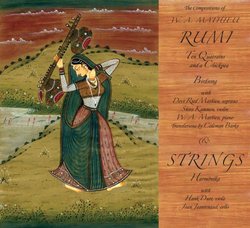| All Artists: W. A. Mathieu Title: Rumi & Strings Members Wishing: 1 Total Copies: 0 Label: Cold Mountain Music Release Date: 8/22/2005 Genre: Classical Style: Chamber Music Number of Discs: 1 SwapaCD Credits: 1 UPC: 783707204109 |
Search - W. A. Mathieu :: Rumi & Strings
 | W. A. Mathieu Rumi & Strings Genre: Classical
Rumi & Strings includes Ten Quatrains and a Chickpea and Birdsong -- song settings of twenty-four ecstatic poems of Jelaluddin Rumi as well as Harmönika -- a string duet for viola and cello composed using modal mo... more » |
Larger Image |
CD Details
Synopsis
Product Description
Rumi & Strings includes Ten Quatrains and a Chickpea and Birdsong -- song settings of twenty-four ecstatic poems of Jelaluddin Rumi as well as Harmönika -- a string duet for viola and cello composed using modal modulation and natural harmonics. Ten Quatrains and a Chickpea One reason Rumi s poems, especially Coleman Barks renditions of them, are ripe for the art-song composer is that the metaphors are so visual and sensual. In the first of these ten brief verses we are shown the nightsinging birds by the creek, singing about a flower made of gold and rubies and emeralds. In the second we envision a frantic fish trying to breathe dry sand. In the final quatrain, a cut reed sips breath like wine; drunk, it starts the high clear notes. You d have to be completely unconscious not to make good songs out of words like these. For me, the biggest challenge has been to stay out of the way of the words, to present them as a feast of delicacies for the singer, with each note bringing out their deliciousness. A Chickpea, my favorite of all Rumi s teaching stories, is a funny, somber, and very beautiful way to be shown the arc of one s life. While singing of life in Rumi's words, Devi Mathieu's voice is fully alive. Each poem's epiphany leaps from the singer in the moment of realization, deeply feelingful and intelligent at once. Shira Kammen's violin is part of the poet's conspiracy to move and transform us: now cajoling, now startling, now jubilating, drawing us back and forth from inner to outer worlds according to the poet s vision. Harmönika Harmönika was written with Hank Dutt and Joan Jeanrenaud in mind, and is dedicated to them. I wanted to write a piece that makes use of their warm, generous sound and displays, especially, the deep resonances of their ensemble. Although the poetry of Rumi is not a specific source for Harmönika, the constant intertwining in Rumi of human and divine love is qualitatively similar for me to the constant admixture of the programmatic and the absolute in musical narrative. Are the players singing to each other, or are the strings singing to the Beloved? My special thanks go to Hank and Joan for their meticulous and profound realization of this work. Birdsong From an original collection of fifty-three poems, I have arranged the thirteen songs of Birdsong as a kind of soul s journey from despair to illumination. The first song, a cry to the Beloved, begins How long are you going to beat me like a drum... and ends I feel...like a flute / that you put in your mouth / and then neglect to blow. W. A. MATHIEU William Allaudin Mathieu (b. 1937) is a pianist, composer, teacher, recording artist, and author. He has composed a variety of chamber and choral works and made numerous solo piano recordings. He has written three books on music -- The Listening Book; The Musical Life; and Harmonic Experience: Tonal Harmony from Its Natural Origins to Its Modern Expression. Allaudin was a disciple of North Indian vocalist Pandit Pran Nath for 25 years. He studied African music with Nubian musician Hamza El Din, jazz with William Russo, and European classical music with Easley Blackwood. In the 1960s, he spent several years as an arranger/composer for Stan Kenton and Duke Ellington, and was the musical director for the Second City Theater in Chicago (which he helped found) and for the Committee Theater in San Francisco. In the 1970s, he served on the faculties of the San Francisco Conservatory of Music and Mills College. In 1969 he founded the Sufi Choir, which he directed until 1982. The past two decades Allaudin has devoted to composition, performance, recording, teaching, and writing from his home near Sebastopol, California.

 Track Listings (30) - Disc #1
Track Listings (30) - Disc #1